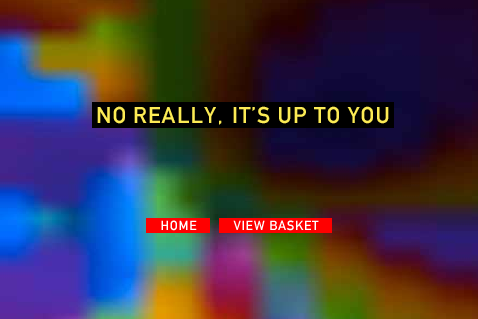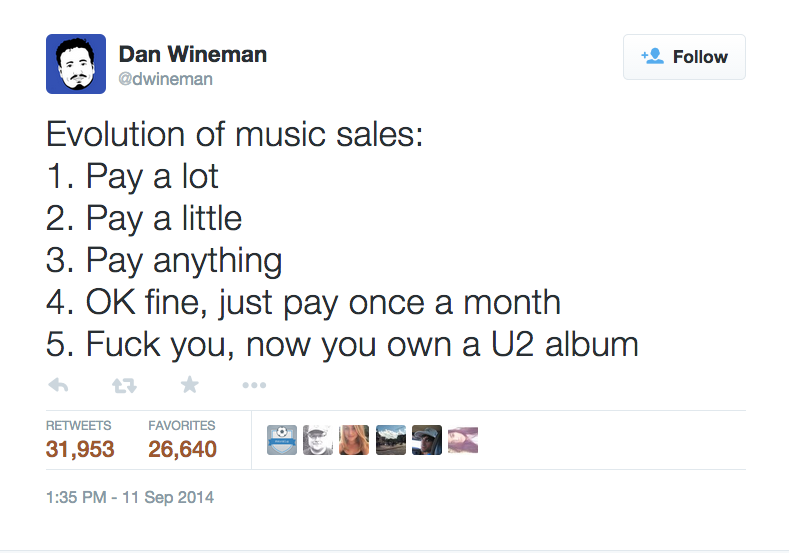It has been predicted that Taylor Swift’s 1989 album will sell 800,000 copies in its first week. All seems to be going well, despite or perhaps because of the fact that the record includes an unexpected Stockhausen tribute in its digital Canadian version. Go girl – push those genre boundaries. (Read the ‘Track 3’ review here.)
I’ve long admired Taylor Swift’s frank acknowledgment of her fans. She’s neither friends with them nor does she pretend they don’t exist: they’re fans, she’s a performer, they love and need her, she loves and needs them, she makes things, they buy things. I wrote about her posting vacation photos and thanking her fans for allowing her to go on vacation because of “their niceness” here a few years ago. In 2012, Swift flew select Twitter followers to New York to literally follow her around during her promo tour. I’m sure Taylor Swift wanted to sit in her hotel and watch Law & Order: SVU like the rest of us, but there she was pied-pipering superfans around the city. You can’t have fan engagement without engaging yourself; it’s a relationship, and the artist has to be in it.
Three acts have recently released records in unexpected ways, calling attention to the pervasive idea that no matter who you are and what you’re releasing, you need worldwide traditional distribution. Do you?
Wu-Tang Clan came out with album available exclusively through portable speakers. The Wu-edition Boombot Rex will cost $79.99, and the new music, as it’s attached to a physical product, cannot be pirated. As told to The Guardian,
“I had the idea pop up into my head, for a while, about music being kind of disconnected to us. Of being so digitised and accessible, but yet not tangible,” said RZA. “But this thing here, a tangible item, like your old Walkman or your old cassette, or your old record, that’s what this is bringing back.”
The group will also release another album–Once Upon a Time in Shaolin–as a single physical copy that they hope will sell for millions and become a collector’s item.
Meanwhile, back on the Internet farm, Radiohead’s Thom Yorke released his most recent album on BitTorrent, a file-sharing site with 170 million users often looked to for pirating TV shows, movies, and music. Specifically, the album was released through a BitTorrent service called Bundles, which allows users to sell their work as torrents. The album, Tomorrow’s Modern Boxes, was sold for $6 on September 26, with vinyl version on offer as part of a larger bundle for $30. Where Taylor Swift, the youngest by a landslide of these artists, has done the traditional lead-up to a major label record release–a Yahoo promotion at the Empire State Building; Diet Coke, Target and Subway ad tie-ins; an upcoming performance on Good Morning America; the release of two advance singles–Thom Yorke simply “released,” or rather, uploaded, his album. The “roll-out” was his Tweeting about it and posting about it on Radiohead’s website and channels.
On Twitter:
I am trying something new, don’t know how it will go. but here it is:) https://bundles.bittorrent.com/bundles/tomorrowsmodernboxes …
As an experiment we are using a new version of BitTorrent to distribute a new Thom Yorke record.
The new Torrent files have a pay gate to access a bundle of files..
The files can be anything, but in this case is an ‘album’.
It’s an experiment to see if the mechanics of the system are something that the general public can get its head around …
If it works well it could be an effective way of handing some control of internet commerce back to people who are creating the work.
Enabling those people who make either music, video or any other kind of digital content to sell it themselves.
Bypassing the self elected gate-keepers.
If it works anyone can do this exactly as we have done.
The torrent mechanism does not require any server uploading or hosting costs or ‘cloud’ malarkey.
It’s a self-contained embeddable shop front…
The network not only carries the traffic, it also hosts the file. The file is in the network.
Oh yes and it’s called
Tomorrow’s Modern Boxes.
Radiohead’s channels are not insignificant, and keep in mind that when Thom Yorke Tweets “meh”, 3000 people retweet it. We should also remember that Radiohead is a band that came to fame with major record label promotion, at arguably the height of power for the labels, with Pablo Honey releasing in 1992 on EMI. Yorke has earned the right several times over to experiment, having been making music since 1985: four long years before Taylor Swift’s now-famous 1989 birth-year. Four days after its unveiling, Tomorrow’s Modern Boxes had sold 408,000 downloads. Six days after, it had been downloaded 1 million times. Previously, Radiohead broke the Internet by releasing In Rainbows–their first non-EMI album, in 2007–on a pay-what-you-will (including free) model. The physical CD, released later, sold 1.75 million units.
At what point is part of the publicity machine how the album is released? New Taylor Swift, Wu-Tang Clan, Thom Yorke, and Radiohead albums would get PR no matter how they were midwifed into this world, but a decision was made in all those cases as to how to get the music to the people who might want to own it. New Beyoncé and Jay-Z albums would also get publicity on their own, but in recent years both artists have received huge amounts of coverage for (suddenly) releasing what was essentially a “bundle” of photos, video, and music on iTunes alone, in Beyoncé’s case (in December 2013), and releasing a new album on a Samsung phone app, in Jay-Z’s case (in July 2013).
With Taylor Swift, there’s an assumption that everyone could be her fan: it’s pop music, “popular” by name and nature. But most artists, certainly classical musicians, need to release albums based on their specific goals. Think about what you’re trying to accomplish before trying to get signed to a traditional label, and before you come up with a scheme to get press attention for how the thing is released. The whole part of the process–what you record, how you record, when you release, how you release–has to be in line with some active goal that you make in advance.
If your album is all new music, maybe your goal is just that: making a ‘record’ of that music. That album should then get into the libraries of as many classical music radio stations as possible, and should probably be given away for free. If you want to tour and don’t have dates, post all the music on SoundCloud so you or the person booking you has a tool. If you already have a tour and you want to have something to sell there, make the CDs yourself and sell them: maybe “signing” them is Sharpie-ing on the CD itself, writing a personal note on an unprinted disc for anyone who’s buying it at a concert. I had this idea (that was shot down by a producer, but anyway) that anyone releasing a “box set” should sell the box first: that way, when a new CD came out, you’d have to buy it, or else this beautiful art-piece box on your shelf would be partially empty. (I was told this wouldn’t work because CDs won’t exist in a matter of years, and it would be difficult to commission a box that would fit all potential forms of media.) If you’re committed to making something physical, give a few moments’ thought to where people are going to put it, and what they’re going to do with it; how many cars still have CD players on their dashboards? If you release something digitally, considering partnering with a site or colleague or label-type-entity that will serve as a megaphone for what you’ve created.
I almost forgot: the third and my personal favorite example of creative packaging and unique distribution…gone completely wrong. On September 9, the new U2 album, Songs of Innocence, was released exclusively on iTunes, automatically showing up in everyone’s iCloud library, “gifted” by the company.
From Apple’s website:
“U2’s newest album, Songs of Innocence, is exclusively on iTunes. Never before have so many people owned one album, let alone on the day of its release.”
Half a billion copies were thrust upon innocent iTunes users, and Internet mockery and outrage ensued. “Apple received so many complaints about the free record,” wrote Forbes, “they actually had to set up an online tutorial to help those trying to get the songs out of their libraries.” Turns out, that while we will go out and get the music of the artists we love, even if we have to buy a portable speaker to do it, we have to decide that we want it. Even if you’re U2, everyone is not your fan. Forbes reported that upon its physical release, Songs of Innocence sold 28,000 copies, 98% physical.
Bono later apologized on Facebook, saying,
“I had this beautiful idea. Might have gotten carried away with ourselves. Artists are prone to that thing. A drop of megalomania, a touch of generosity, a dash of self-promotion, and deep fear that these songs that we poured our life into over the last few years might not be heard. There’s a lot of noise out there. I guess, we got a little noisy ourselves to get through it.” (via The Verge)
The whole ordeal, however, did result in one of my favorite Tweets of all time, from Dan Wineman:


